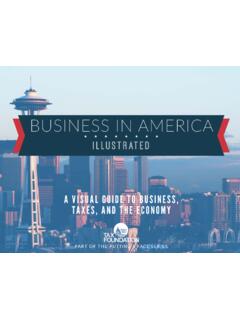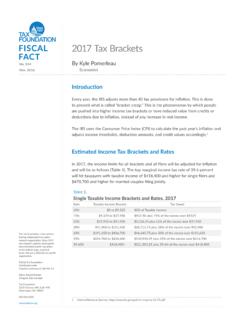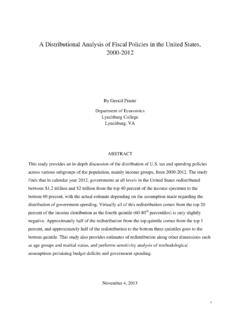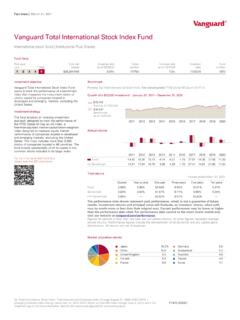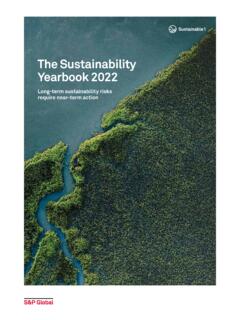Transcription of International tax competitiveness Index 2021
1 International tax competitiveness Index 2021 Daniel BunnElke AsenInternational tax competitiveness Index 2021 2021 Tax FoundationTax Foundation1325 G Street, Suite 950 Washingtion, 20005202-464-6200 Introduction 1 The International Tax competitiveness Index 12021 Rankings 2 Table 1. 2021 International Tax competitiveness Index Rankings 3 Notable Changes from Last Year 4 Table 2. Changes from Last Year 5 Methodological Changes 7 General 7 Corporate Tax 7 Individual Taxes 7 Property Taxes 8 Cross-Border Tax Rules 8 Corporate Income Tax 9 Combined Top Marginal Corporate Income Tax Rate 9 Cost Recovery 9 Table 3.
2 Corporate Tax 10 Tax Incentives and Complexity 13 Individual Taxes 16 Table 4. Individual Taxes 17 Taxes on Ordinary Income 18 Complexity 19 Capital Gains and Dividends Taxes 20 Consumption Taxes 22 Consumption Tax Rate 22 Consumption Tax Base 22 Table 5. Consumption Taxes 23 Complexity 24 Property Taxes 25 Real Property Taxes 25Ta b l e 6 . P r o p e r t y Ta xe s 26 Wealth and Estate Taxes 27 Capital, Wealth, and Property Taxes on Businesses 28 TABLE OF CONTENTSC ross-Border Tax Rules 30 Territoriality 30 Table 7. Cross-Border Tax Rules 31 Withholding Taxes 33 Tax Treaty Network 34 Anti-Tax Avoidance Rules 34 Country Profiles 37 Methodology 50 The Calculation of the Variable, Subcategory, Category, and Final Score 50 Calculating Subcategory Scores 51 Calculating Category Scores 51 Calculating Final Scores 52 Distribution of the Final Scores 52 Data Sources 53 AppendixAppendix Table A.
3 55 Appendix Table B. 57 Appendix Table C. 58 Appendix Table D. 59 Appendix Table E. 61 TAX FOUNDATION | 1 INTRODUCTIONThe structure of a country s tax code is a determining factor of its economic performance. A well-structured tax code is easy for taxpayers to comply with and can promote economic development while raising sufficient revenue for a government s priorities. In contrast, poorly structured tax systems can be costly, distort economic decision-making, and harm domestic countries have recognized this and have reformed their tax codes.
4 Over the past few decades, marginal tax rates on corporate and individual income have declined significantly across the Organisation for Economic Co-operation and Development (OECD). Now, most OECD nations raise a significant amount of revenue from broad-based taxes such as payroll taxes and value-added taxes (VAT).1 Not all recent changes in tax policy among OECD countries have improved the structure of tax systems; some have made a negative impact. Though some countries like the United States and France have reduced their corporate income tax rates by several percentage points, others, like Turkey, have increased them.
5 Corporate tax base improvements have occurred in Chile and the United Kingdom, while the corporate tax base has been made less competitive in Belgium. The COVID-19 pandemic has led many countries to adopt temporary changes to their tax systems. Faced with revenue shortfalls from the downturn, countries will need to consider how to best structure their tax systems to foster both an economic recovery and raise variety of approaches to taxation among OECD countries creates a need to evaluate these systems relative to each other. For that purpose, we have developed the 1 Cristina Enache, Sources of Government Revenue in the OECD, Tax Foundation, Feb.
6 11, 2021, Organisation for Economic Co-operation and Development (OECD), Tax and Economic Growth, Economics Department Working Paper No. 620, July 11, 2008. International Tax competitiveness Index a relative comparison of OECD countries tax systems with respect to competitiveness and International Tax competitiveness IndexThe International Tax competitiveness Index (ITCI) seeks to measure the extent to which a country s tax system adheres to two important aspects of tax policy: competitiveness and competitive tax code is one that keeps marginal tax rates low.
7 In today s globalized world, capital is highly mobile. Businesses can choose to invest in any number of countries throughout the world to find the highest rate of return. This means that businesses will look for countries with lower tax rates on investment to maximize their after-tax rate of return. If a country s tax rate is too high, it will drive investment elsewhere, leading to slower economic growth. In addition, high marginal tax rates can impede domestic investment and lead to tax to research from the OECD, corporate taxes are most harmful for economic growth, with personal income taxes and consumption taxes being less harmful.
8 Taxes on immovable property have the smallest impact on , a neutral tax code is simply one that seeks to raise the most revenue with the fewest economic distortions. This means that it doesn t favor consumption over saving, as happens with investment taxes and wealth taxes. It also means few or no targeted tax breaks for specific activities carried out by businesses or individuals. 2 | International TAX competitiveness INDEXAs tax laws become more complex, they also become less neutral. If, in theory, the same taxes apply to all businesses and individuals, but the rules are such that large businesses or wealthy individuals can change their behavior to gain a tax advantage, this undermines the neutrality of a tax tax code that is competitive and neutral promotes sustainable economic growth and investment while raising sufficient revenue for government are many factors unrelated to taxes which affect a country s economic performance.
9 Nevertheless, taxes play an important role in the health of a country s measure whether a country s tax system is neutral and competitive, the ITCI looks at more than 40 tax policy variables. These variables measure not only the level of tax rates, but also how taxes are structured. The Index looks at a country s corporate taxes, individual income taxes, consumption taxes, property taxes, and the treatment of profits earned overseas. The ITCI gives a comprehensive overview of how developed countries tax codes compare, explains why certain tax codes stand out as good or bad models for reform, and provides important insight into how to think about tax to some data limitations, recent tax changes in some countries may not be reflected in this year s version of the International Tax competitiveness RankingsFor the eighth year in a row, Estonia has the best tax code in the OECD.
10 Its top score is driven by four positive features of its tax system. First, it has a 20 percent tax rate on corporate income that is only applied to distributed profits. 3 Costa Rica joined the OECD in May 2021, becoming its 38th member. Due to data availability Costa Rica is not included in this edition of the Index but will be included starting next , it has a flat 20 percent tax on individual income that does not apply to personal dividend income. Third, its property tax applies only to the value of land, rather than to the value of real property or capital.



